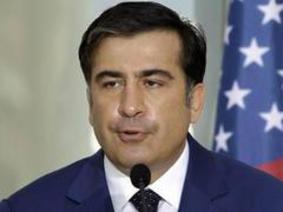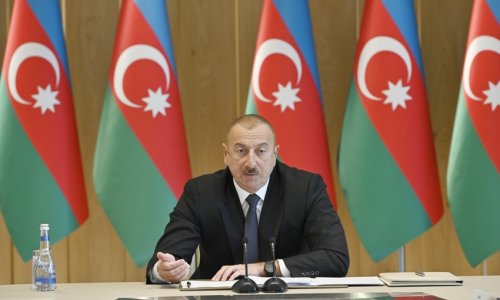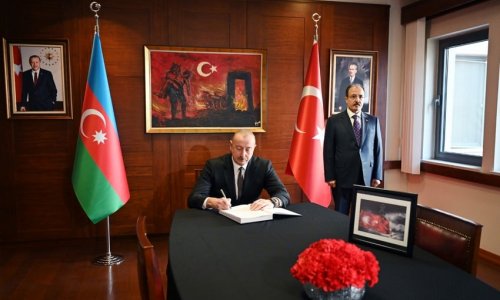By Leonid Bershidsky
Just eight months ago, former Georgian President Mikheil Saakashvili languished in Brooklyn, "plotting a triumphant return" to his homeland, according to the New York Times. As of last weekend, however, he is a citizen of Ukraine and governor of Odessa, a region in the southwest of that country. His appointment is an effort by President Petro Poroshenko of Ukraine to prove reforms are possible, and may be part of a plan to make Saakashvili prime minister in place of Poroshenko's reluctant ally, Arseniy Yatsenyuk.
In Georgia, Saakashvili is a wanted man, accused of a range of crimes, including spending $11,000 of government funds for Botox injections and using excessive force to dispel anti-government protests in 2007. Though the ex-president has called the charges a "farce" and the U.S. State Department has hinted they constituted "political retribution," they mean his chances of returning home were slim. Georgia's ruling coalition, which beat Saakashvili's supporters in the 2013 elections, is the country's most popular political force. According to a recent poll by the National Democratic Institute, only 16 percent of Georgians would vote for Saakashvili's party.
The ex-president used his U.S. hiatus to set up a think tank, make paid speeches and, apparently, contemplate an academic career. Then a better option came up: Poroshenko wanted his help.
The Ukrainian president admires the sweeping economic and political reforms that took place in Georgia after Saakashvili came to power in 2004. They led to quick and spectacular results: the almost total elimination of low-level corruption and the quick deregulation of the economy, which has caused Georgia to climb to the top 20 of the World Bank's ease-of-doing-business rankings. Fast economic growth followed, though the base was so low that Georgia is still an extremely poor country, with a per capita economic output (at purchasing power parity) close to that of Swaziland and El Salvador. The Saakashvili reforms almost certainly prevented Georgia from failing as a state.
In recent months, the Poroshenko administration has drafted a number of Georgians from the Saakashvili team to help bring about a similar miracle. Ukraine's health minister is Georgian, as are several deputy ministers. Yet Poroshenko initially had no luck recruiting Saakashvili. The former president turned down the job of deputy prime minister, then refused to take part in a contest for the top job at Ukraine's new Anti-Corruption Bureau. Each time, he cited his desire to keep his Georgian citizenship. He did accept a freelance job as head of Poroshenko's economic reform council. "I really didn't want to be part of Ukrainian politics: I don't understand it, it's not my style," Saakashvili explained in an April interview. "Always there's some kind of subtext, and under-the-rug game. And I like clarity, I hate intrigues, all that two-faced Byzantine stuff."
Now, suddenly, he is in smack in the middle of Byzantine Ukrainian politics. He replaces a protege of billionaire Igor Kolomoisky, who has clashed with Poroshenko over control of state assets and is now one of the president's most powerful opponents. Saakashvili has agreed to serve as Poroshenko's proxy in one of the country's wealthiest but most corrupt regions, which includes Ukraine's biggest seaport and seaside resort. The Odessa region also borders on neighboring Moldova's frozen conflict zone of Transnistria, where a Russian military contingent guards an enormous Soviet-era arms warehouse.
Why would he accept this difficult governorship after having turned down higher-ranking jobs? "It's a very popular version behind the scenes that the job off prime minister could even be his next stop," Kiev political scientist Vladimir Fesenko told Interfax Ukraine. Saakashvili himself denied that, saying he still planned to return to Georgia once he made Odessa a success. Yet Saakashvili is ambitious, and Poroshenko needs more unity at the top because time is running out for him to show the country is changing.
The International Monetary Fund mission that worked in Kiev last month has departed, noting the government's commitment to reform, but also that the loss of much of Ukraine's industrial potential in the east was a bigger problem than expected. The IMF predicts the country's economy will shrink 9 percent this year -- a more pessimistic assessment than the Bloomberg consensus forecast of a 6.75 percent contraction. In the first quarter, however, Ukraine's economic output shrank by a stunning 17.6 percent, and inflation in April reached 61 percent, year-on-year. The government says it's collecting more tax revenue than last year, but currency devaluation accounts for much of that, and, correcting for inflation, revenue is falling. The only reason Ukraine isn't bankrupt is that it's propped up by foreign loans. To keep it alive, the IMF will need to release another $5 billion bailout tranche this month, despite Ukraine's inability so far to reach a deal with private creditors, who are resisting taking a loss on the nominal value of the country's debt.
These are hardly spectacular results for Poroshenko's first year as president, especially since the conflict in the east still smolders with no end in sight.
Poroshenko needs to turbocharge his efforts if, as his Chief of Staff Boris Lozhkin told me earlier this year, he plans to stay on for a second term.
There's no love lost between Poroshenko and Yatsenyuk, who held on as prime minister when his party did unexpectedly well in October's parliamentary elections. Members of the president's team have often accused Yatsenyuk of holding back reform. At the same time, some of the foreign reformists Poroshenko has appointed to the cabinet have complained to me that the iron political will that existed in Saakashvili's Georgia was absent in Ukraine, which meant that necessary changes stalled.
Letting Saakashvili take some flashy anti-corruption measures in Odessa while grooming him for Yatsenyuk's job would be a high-yield but risky strategy for Poroshenko: The former Georgian president is a powerful irritant to Russia, which waged a victorious war against him in 2008, cementing the secession of two Georgian regions, Abkhazia and South Ossetia. "The circus has come to town," Russian Prime Minister Dmitri Medvedev tweeted about Saakashvili's appointment. "Pity Ukraine."
Yet Poroshenko knows he could waste an opportunity unless he goes all-in. Expect more unorthodox moves from him as he struggles to regain momentum and looks for battles to win.
(Bloomberg)
www.ann.az
Follow us !











